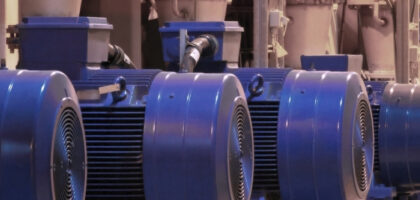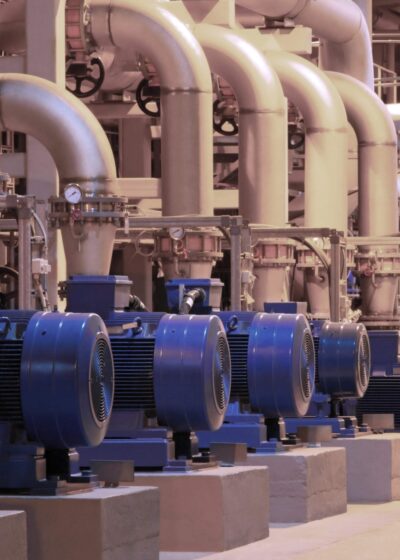
Magnetic Drive Pump Guide
How do magnetic drive pumps work?
Generally speaking, pumps can be divided into two groups: mechanically sealed pumps and seal-less magnetic drive pumps. Rather than having a mechanical seal or packing to prevent liquid from escaping from between the motor and pump shaft, magnetic drive pumps, also known as magnetically coupled pumps, use two sets of magnets. The first set of magnets (drive magnet) is attached to the shaft operated by the motor and is responsible for driving the inner motor. As the motor turns on, it spins its magnet, producing magnetic force, making the magnet attached to the impeller spin and rotate the impeller. The rotation of the impeller produces a power that drives the liquid through the pump.
Mag drive pumps have no direct connection between the electric motor shaft and the impeller, meaning no seals are needed, and the risk of leakage is eliminated. This is a major advantage, especially for applications involving transferring chemicals, acids and other flammable and hazardous fluids. Being an enclosed piece of equipment, magnetic drive pumps do not need lubrication for operation as they use the pumped liquid. Magnetic drive pumps’ advantages can be combined with different pump technologies such as centrifugal pumps, vane pumps, screw pumps and regenerative turbine pumps, providing ideal pumping solutions for various applications.

Design Benefits
The design of the magnetic drive pump gives several distinct advantages over mechanically sealed pumps and the regular centrifugal pump.
- Leak-proof design – The magnetic coupling completely eliminates the risk of fluid leakage as there are no mechanical seals to fail over time. There isn’t any risk of wasting expensive liquid while transferring and exposing people working on the pump or near it to hazardous, corrosive, flammable and/or explosive fluids and other toxic chemicals.
- Low maintenance and reliable design - As magnetic drive pumps are seal-less, they have one less part to wear and maintain, reducing time and cost to the user.
- No misalignment issues – As there is a small air gap between the magnet and the motor and pump. As there is no physical contact, misalignment and thermal expansion which can cause premature wear is not a problem.
- Risk of fines reduced- The mag drive pump design adheres to many strict environmental and safety objectives required by regulations for specific applications involving hazardous and flammable fluids.
Potential drawbacks of magnetic drive pumps
Magnetic drive pumps are reliable and robust pumping solutions but have design limitations under certain scenarios making them not ideal for every application.
- Limited solid handling capabilities – Mag drive pumps are best suited for clean liquids as the presence of solids can stick to the magnet and interfere with the pump performance and even cause pump failure.
- Power and torque limitations – Magnetic drive pumps can be sensitive to extreme operating conditions; if excessive torque exceeds the capabilities of a magnetic coupling, the magnetics may decouple, and the pump shaft will slip causing stoppages.
- Can’t handle hot temperature fluids – If a magnetically coupled pump is exposed to temperatures above its capabilities, it can begin to lose its magnetism, becoming less efficient and requiring a repair.
- Can’t handle dry running – This is one of the biggest drawbacks of mag drive pumps. The main reason is that the pumped liquid act as a lubricant, so in case of dry running, the bearing and some other components could overheat and eventually become damaged.
Typical applications of magnetic drive pumps
Commonly used in the chemical industry, magnetic drive pumps are ideal for transferring hazardous/dangerous fluids, ultra-pure liquids and hard-to-seal liquids that can crystallize upon the seals of a pump when exposed to air. Given the above design benefits, magnetically coupled pumps are commonly used but are in no way limited to the following applications:
- Chemicals
- Hazardous and corrosive liquids
- Crystallising fluids
- Cryogenics
- Food and beverage
- Oil, fats, lubricants, cooling liquids
- Water Treatment
- Surface Conditioning
- Photo Processing
- Tank cleaning
- Tank to tank transfer
- Pressure boosting
- Dosing
Difference between the magnetically coupled pump and mechanical seals
To summarise all the advantages and disadvantages of magnetically coupled pumps we have prepare a helpful table comparing mechanically sealed pumps with magnetic drive pumps.
| Type | Mechanical Seal | Magnetically coupled |
| Sealing the pump fluid | The mechanical seal prevents the fluid from leaking while the pump is operating but there is still a risk of fluid leakage | The motor is coupled to the pump by a magnet and there are no seals that eliminate the risk of leakage. |
| Wear and maintenance | Due to the constant movement between parts that are in contact with each other, with the time mechanical seals can wear and result in increased leakage. | Eliminating the seals for magnetically coupled pumps also get rid of associated friction loss, wear and noise, meaning cost-effective maintenance and efficient pump operation. |
| Solid handling | Able to handle solids | Only suited to clean liquids |
| Dry running | Can handle dry running depending on the pump technology | It can result in overheating the bearing and other components and getting damaged |
| Power and torque | Higher due to firm connection. | Can decouple under extremely high torque. Not as powerful as mechanically sealed pumps |
| Handling hot temperature fluids | Able to handle high temperature | Can begin to lose its magnetism, becoming less efficient and requiring a repair. |
| Applications | Suitable for various applications including food and beverage processing, marine applications and other industrial applications | Highly reliable for pumping hazardous, corrosive, aggressive, crystalline, expensive, and high purity fluids. |
Does this sound like what you need?
If from reading the above it sounds as though a magnetic drive pump suits your industrial process application, take a look at our range of magnetically coupled pumps.


